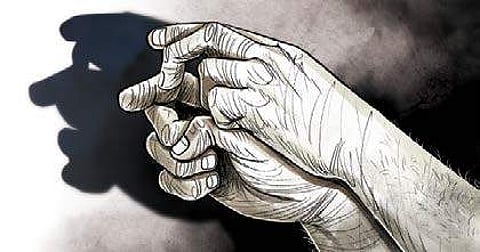

Aurangzeb, the sixth and last emperor of the Mughal Empire, is more vilified than his five ancestors put together. Does he deserve such vilification? Aurangzeb plundered the port of Surat, reimposed the hated jizya tax on non-Muslims that his great-grandfather Emperor Akbar had abolished and destroyed thousands of Hindu temples. Within decades of his death in 1707, the Mughal Empire collapsed. Aurangzeb’s cruelty towards his own family and ruthlessness towards his subjects makes him a villainous figure in contemporary history.
But there of course is another Aurangzeb, the Kashmiri jawan abducted, tortured and killed by Pakistani terrorists last month. Aurangzeb served with 44 Rashtriya Rifles. He was kidnapped on the way home from his Army camp during Ramzan while the unilateral “ceasefire” declared by Indian security forces was still in place.
Rifleman Aurangzeb’s calm demeanour as his captors interrogated him on camera minutes before killing him was a chilling reminder of the daily dangers Indian soldiers face from Pakistan’s proxy terror war and the heroism of young jawans.
But the story of the two Aurangzebs separated by over 300 years of history highlights India’s struggle to fight both terrorism and communalism. Terrorism is a black and white issue; communalism has several shades of grey. The Congress and Left claim that since the Modi government took office, minorities have been marginalised. Many live in fear. Their livelihoods, for example, in the meat processing and leather industries have been severely hit. A Hindu Rashtra will overturn India’s long history of pluralism. The BJP does not have a single Muslim MLA in Uttar Pradesh or Gujarat among its over 400 MLAs in the two states put together. The Congress and Left are right in identifying these symptoms but wrong in ignoring their causes. Until these are remedied, the symptoms will get worse, not better.
Mahatma Gandhi was a saint but like all saints he had his foibles. Early in the freedom movement, soon after his arrival in India from South Africa in 1915 at the age of 45, the Mahatma (a title he had yet to acquire) cast his lot with the global Muslim brotherhood. The Ottomans had been defeated along with their German allies in the First World War in 1918. The centuries-old Caliphate, the centre of Islamic authority as the Vatican is of Catholicism, was abolished in 1924. Gandhi had thrown his considerable moral weight behind Muslims in India between 1919 and 1924 with the India-centred Khilafat movement to press Britain to revive the Caliphate in Istanbul.
Though the movement failed, Gandhi was making a shrewd calculation. He knew the sheer number of Muslims in India (nearly a third of British-occupied India’s population) meant that Muslims had to form an integral part of the freedom movement. Their cooperation was essential. The Muslim League’s later betrayal of Gandhi, Nehru and Patel was still over a decade away.
Gandhi believed he understood the Muslim mind. For nearly 200 years, from Emperors Babur to Aurangzeb, the Mughals had ruled India. The British filled the vacuum after 1757 following the decisive battle of Palashee in Bengal. Hindus silently welcomed the British triumph over the debauched Nawab of Bengal Siraj ud-Daulah, helped by the turncoat Mir Jafar Ali Khan. Many of the Nawab’s Hindu subjects regarded the British as a means to eliminate Muslim rule for good.
But 170 years after Robert Clive’s victory over the Nawab of Bengal, Gandhi realised Muslims in the British Raj could be more useful in the freedom struggle as allies rather than as enemies. Gandhi had no delusions about the fealty of Muslims for his mission. As 1947 approached, Jinnah would prove him right. But for Gandhi Muslims had two uses: one, to help India end British rule just as mercenary Hindu soldiers in the British Indian army had helped the British end Muslim rule. The Mahatma had more of the Machiavelli in him than most realised.
There was a second reason why Gandhi wooed Muslims despite their leaders’ betrayal over Partition. That reason was purely pragmatic. After Independence, Hindus and Muslims would have to live together in peace if India were to fulfil its potential as a liberal, plural democracy. Gandhi knew Muslims and Hindus suffered from a complex. Muslims still thought of themselves as rulers despite the 190-year British interregnum. They demanded and got special privileges—minority institutions, opaque Wakf boards and immutable personal laws.
For Gandhi, Nehru, Patel and Ambedkar these were necessary compromises to ensure India emerged united from the trauma and bloodshed of Partition. Gandhi recognised too the complex Hindus harboured: victimhood. Their subjugation over centuries of often brutal Muslim and British rule had created a deep well of grievance among Hindus. He needed to balance the interests of both communities to secure India’s long-term future. By mollifying the Muslim minority, Gandhi unwittingly but not entirely unknowingly invoked Isaac Newton’s third law of motion: every action has an equal and opposite reaction. It is no coincidence that Gandhi’s Khilafat movement from 1919-1924 to save the Ottoman Caliphate in Istanbul sparked Hindu revivalism. It is no coincidence either that the RSS was founded in 1925. Hindutva had arrived.
It would take another 73 years for revivalist Hinduism to win political power in 1998. Atal Bihari Vajpayee was cast in a quasi-Nehruvian mould. Under him, the historical balance of power between Muslims and Hindus stirred but didn’t shake. Sixteen years later in 2014, when Narendra Modi rode to power, the old order did shake.
We began with two Aurangzebs, set apart by over 300 years. The Congress recently compared Modi to the early Aurangzeb. Were he alive, the Mahatma would have told the Congress that by doing so it was, once again, risking invoking Newton’s law.
Minhaz Merchant
The author is an editor and publisher
Tweets @MinhazMerchant